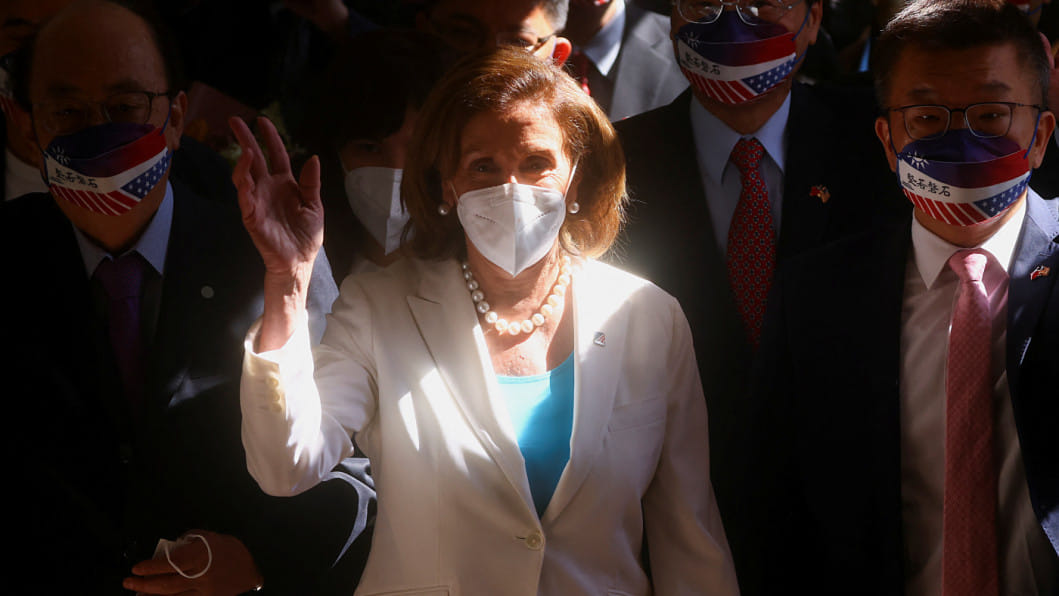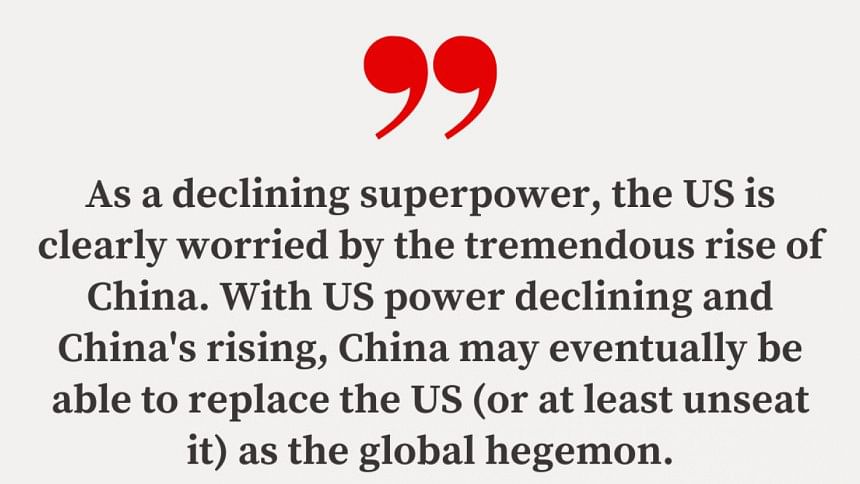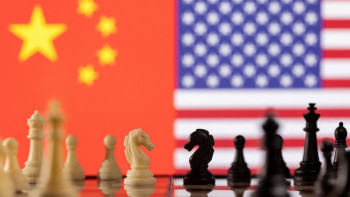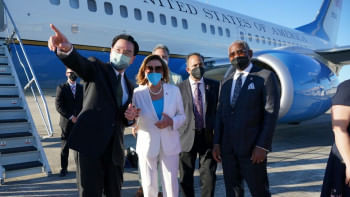Pelosi’s Taiwan visit: Overstepping China’s ‘red line’

For domestic political reasons, it is not difficult to see why US politician Nancy Pelosi chose this particular time to visit Taiwan. The unpopularity of incumbent President Joe Biden, including among his fellow democrats, could be chief among them. According to a recent CNN poll, a whopping 75 percent of his own party members don't want him to run for re-election in 2024. As speaker of the US House of Representatives, Pelosi is arguably third in line for the presidency. The visit could have been a stunt to bolster her national security credentials.
Secondly, it could be that the US is looking for a face-saving reason to redirect its geostrategic focus away from Eastern Europe, where the US-backed Ukrainian government has faced numerous setbacks in the last few months. The latest Gallup poll showed that just one percent of Americans consider Russia as a "major problem" for the US. So, the Ukrainian conflict seems to be quite unpopular at home.
If, however, domestic reasons were not the prime motivators for the visit, as seen by China, then that would be most worrying for global stability.
As a declining superpower, the US is clearly worried by the tremendous rise of China. With US power declining and China's rising, China may eventually be able to replace the US (or at least unseat it) as the global hegemon. Since time is on China's side, many experts have warned that the world may be at risk of falling into the "Thucydides Trap" – an apparent tendency towards war, described by US political scientist Graham T Allison, when an emerging power threatens to displace an existing great power as the regional or international hegemon.
Upon landing in Taiwan, Nancy Pelosi tweeted: "Our visit is one of several Congressional delegations to Taiwan – and it in no way contradicts longstanding United States policy, guided by the Taiwan Relations Act of 1979, US-China Joint Communiques and the Six Assurances." However, China doesn't see it that way. And that's because the situation now is far different from 25 years ago when then-house speaker Newt Gingrich visited the island.
Back then, the then-ruling Kuomintang (KMT) party still maintained the "One China" line, reached under the 1992 Consensus established by the National Unification Council of the Republic of China (official title for what Westerners refer to as Taiwan), which saw itself as a government in exile. This line was still acceptable to the mainland, i.e., the People's Republic of China, because it recognised that there is one China and Taiwan is a part of it.
However, in 2019, the current Taiwan leader Tsai Ing-wen of the Democratic Progressive Party (DPP) completely rejected the established 1992 Consensus. That was when Beijing started to refer to the Taiwan government under the DPP as "Taiwan independence forces". So, Gingrich's visit, unlike Pelosi's, was not seen as a recognition of separatist forces.
Additionally, Pelosi took an official US government plane to Taiwan, which implies there is an official connection. But part of the US' "One China" pledge is that it will only maintain unofficial ties with Taiwan. President Joe Biden had also recently sown doubts over America's commitment to the "One China" policy, replying when asked if the US would get involved military to defend Taiwan: "Yes. That's the commitment we made". But the US had never before directly promised to intervene militarily in a conflict with China. And this delicate equilibrium is what had helped deter Taiwan from declaring full independence and China from invading.
Post-Pelosi's visit, Beijing suggested the visit may have been part of US' tactic at creating a pretext to deploy more of its military to the region, and declared a massive set of military exercises set in Taiwan's own territorial waters, with some designated spot even being as little as 12 miles away from its coast. In a statement made during his visit to Bangladesh, Chinese Foreign Minister Wang Yi said that regional players ought to oppose the ramping up of America's military presence in the vicinity of Taiwan, thereby hinting that Beijing is ready to up the stakes if necessary. And this clearly shows that US-China relations are at its worst in decades.

But looking back, all this seems to have been inevitable.
In 2015, the US Rand Corporation conducted a scenario study – commissioned by the US army – of a future war against China, entitled, "War with China: Thinking the Unthinkable". According to the Rand report: The need to think through war with China is made all the more important by developments in military capabilities. Sensors, weapon guidance, digital networking, and other information technologies used to target opposing forces have advanced to the point where both US and Chinese military forces seriously threaten each other, and creates the means as well as the incentive to strike enemy forces before they strike one's own.
In light of that, one aspect of Pelosi's Taiwan visit that has been largely overlooked is her meeting with Mark Lui, chairman of Taiwan's Semiconductor Manufacturing Corporation (TSMC). As some experts have pointed out, Pelosi's visit coincided with US efforts to persuade TSMC – the world's largest chip manufacturer, on which the US is heavily reliant – to establish a manufacturing base in the US and to stop making advanced chips for Chinese companies. Semiconductors – or computer chips – are essential to all the networked devices that have become embedded into our lives and have advanced military applications.
Taiwan's position in the world of semiconductor manufacturing has become a bit like Saudi Arabia's status in OPEC. TSMC has a 53 percent market share of the global foundry market (factories contracted to make chips designed in other countries), while other Taiwan-based manufacturers claim an additional 10 percent of it.
According to the Biden administration's 100-Day Supply Chain Review Report: "The United States is heavily dependent on a single company – TSMC – for producing its leading-edge chips." The fact that only TSMC and Samsung can make the most advanced semiconductors "puts at risk the ability to supply current and future [US] national security and critical infrastructure needs." As such, the US has been trying to attract TSMC to the US to increase its domestic chip production capacity. In 2021, with the support of Biden's administration, the company bought a site in Arizona on which to build a US foundry.
Coincidentally, the US Congress just passed the Chips and Science Act, which provides USD 52 billion in subsidies to support semiconductor manufacturing in the country. But companies will only receive Chips Act funding if they agree not to manufacture advanced semiconductors for Chinese companies. Meaning that TSMC and others may well have to choose between doing business in China or the US because the cost of manufacturing in the US is considered too high without government subsidies. And this could well be part of a broader "tech war" between the US and China – which we have been seeing of late with what has been happening with Huawei.
But under the current global circumstances, if Pelosi's visit was motivated by the US' goal of "containing China", that could be a big miscalculation on its part. For the first time since the end of the Cold War, the Western world order is under severe threat. The US has failed to "persuade" most countries outside of its main sphere of influence – i.e., the EU, Japan, Australia and few others – to put pressure on Russia. With its diplomatic influence over other countries waning, and Russia seemingly winning the war on the ground in Ukraine, will the US be overextending itself by getting involved in a confrontation with China over Taiwan?
With Russia and China seemingly marching in lockstep, this could be the perfect time for China to put its foot down with regards to Western interference in the Asia-Pacific region, realising that the US is in no position to get involved in another conflict, that too, on a completely new front. Although using military might has not been the Chinese style, China has strongly indicated that it seeks to make the US pay for Pelosi's Taiwan visit, which overstepped its "red line".
As for Taiwan's 23 million people and for President Tsai Ing-Wen, "the rare high-profile visit was no doubt welcome in the face of increasing global isolation on account of China's pressure," according to The Hindu. However, that short-term benefit may "be offset by the fact that Ms Pelosi arguably left Taiwan with a far worse strategic environment."
As for global stability, even though the long-term consequences of this visit remain to be seen, it has only increased the likelihood of a coming conflict between the US and China. And given the number of global crises the world is currently going through, that increased likelihood can only be detrimental for all.
Eresh Omar Jamal is assistant editor at The Daily Star. His Twitter handle is: @EreshOmarJamal

 For all latest news, follow The Daily Star's Google News channel.
For all latest news, follow The Daily Star's Google News channel. 






Comments